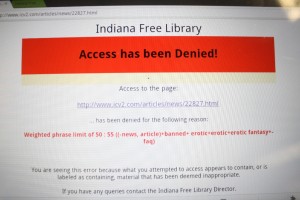The year was 1954. An unknown group named Bill Haley and the Comets records “Rock Around the Clock.” President Eisenhower informs and warns concerned Americans about the falling domino principle of communism as tensions rise in a little-known country named…
198 search results for "prison book ban"
Comic Spring in the Arab World
Comic artists and cartoonists in Arab nations and much of the Middle East have been cultivating a new era of cultural, social, and political importance of the media. These artists have been defiant, often risking their lives in the face…
The Sordid Tale of The Lone Avenger’s Rise to Infamy
In examining the history of comic book censorship, sometimes it is difficult for people to separate the creator from the creation. A clear example of this is the sad tale of Australian comic creator Len Lawson and his creation, The…
Danish Report Discredits Link Between Cartoons and Child Sex Abuse
The Copenhagen Post reveals that a report issued by experts at Sexologisk Klinik discredits claims that cartoon depictions of underaged characters engaging in sex acts encourage people to commit child sex crimes in real life. The report to the justice…
Access Denied: Library Filter Fail
 While researching a story about role-playing-game censorship for CBLDF.org at his local library, CBLDF blog volunteer Justin Brown encountered the cold slap of censorship himself as the result of aggressive filtering software. Brown discusses his experience, and the heritage of filtering laws that requires libraries like his to deny access to content or risk losing public funding after the jump.
While researching a story about role-playing-game censorship for CBLDF.org at his local library, CBLDF blog volunteer Justin Brown encountered the cold slap of censorship himself as the result of aggressive filtering software. Brown discusses his experience, and the heritage of filtering laws that requires libraries like his to deny access to content or risk losing public funding after the jump.
Critical Fail: The Censorship of RPGs
by Justin Brown
Let’s say you’ve been reading up on the CBLDF coverage of the top 10 banned books of 2011, which included a graphic novel in the #2 spot, and you want to vent your frustrations by gathering with a group of friends to play a trending role-playing-game. You amble amongst local comic shops, book stores and libraries to obtain the newest player manual only to discover that it has been banned or censored to the point of being unplayable. (I mean, who wants to try to bewilder a bug-bear with a rubber-mallet-of-kindness? Ok, that scenario is a little farfetched, but you get the picture.) According to a recent article on ICv2, censorship has branched out to include RPGs for many of the same reasons that comic books have been challenged and censored.
More on RPG censorship after the jump.
Arizona Legislature Narrows Focus of Worrisome Electronic Speech Bill
Earlier this month, we announced that Arizona’s HB 2549 — a bill that could have limited constitutionally-protected electronic speech — had been pulled back by the state legislature for revision. This week, Eugene Volokh with The Volokh Conspiracy laid out those revisions, discussing how the revisions conform to constitutional standards. In sharing a letter written by the Media Coalition in opposition to the bill, CBLDF was one of the first organizations to cover a story that had otherwise flown under the radar. In its original form — which the Arizona legislature had passed and was on Arizona governor Jan Brewer’s desk for signature — the bill could have created vulnerabilities for cartoonists and publishers.
Click through for more on the revisions to HB 2549.
In the Wake of Protest and Public Scrutiny, Arizona Legislature Pulls Back Electronic Speech Censorship Bill
ABC 15, an Arizona affiliate is reporting that a sweeping electronic media censorship bill passed by the state’s legislature last week and headed to Governor Jan Brewer’s desk for signature has been pulled back in the wake of public outcry. Last week, CBLDF called attention to the bill and its constitutional deficiencies, helping to spark a wave of media coverage that turned the tide against the bill.
Lawmakers intended the law to protect people from online stalkers and bullies, but the law was so broadly worded that it would apply to the internet as a whole, not one-to-one communications, and the legislation does a poor job of defining the material that would run afoul of the law. As a result, anyone posting constitutionally-protected material could face charges if an individual deemed the material was intended to “annoy,” “offend,” “harass,” or “terrify.”
Read more about Arizona House Bill 2549 after the jump…
Canada Customs Case in the News
 With the recent spate of legal victories that CBLDF has celebrated, Brigid Alverson with CBR’s Robot 6 blog took a moment to touch base with CBLDF Executive Director Charles Brownstein about the Canada Customs Case:
With the recent spate of legal victories that CBLDF has celebrated, Brigid Alverson with CBR’s Robot 6 blog took a moment to touch base with CBLDF Executive Director Charles Brownstein about the Canada Customs Case:
It’s been a momentous week for the CBLDF. Last Friday we announced our decision to build a coalition to aid an American traveler facing prison time in Canada and registering as a sex offender for traveling with comics on his laptop. On Monday we received news that the U.S. Supreme Court had struck down a California law that would have made violence a new category of unprotected speech by banning the sale and display of violent video games, and that Justice Scalia cited our amicus brief as part of his majority decision. And just today news arrived that we successfully helped knock out an Alaska law that would have placed severe restrictions on internet speech. more
CBLDF Looks to Canada Customs Case
 Last week, CBLDF announced that we are forming a coalition to defend a new case involving an American citizen facing charges in Canada that could result in a minimum sentence of one year in prison and registering as a sex offender.
Last week, CBLDF announced that we are forming a coalition to defend a new case involving an American citizen facing charges in Canada that could result in a minimum sentence of one year in prison and registering as a sex offender.
In 2010, an American citizen, computer programmer, and comic book enthusiast in his mid-20s was flying from his home in the United States to Canada to visit a friend. Upon arrival at Canadian Customs, a customs officer conducted a search of the American and his personal belongings, including his laptop, iPad, and iPhone. The customs officer discovered manga on the laptop and deemed it child pornography. Consequently, the American has been charged with both the possession of child pornography as well as its importation into Canada. As a result, if convicted at trial, the American faces a minimum of one year in prison.
Since the announcement, more information about the case emerged in the ensuing media coverage. more
CBLDF needs your help! Please make a monetary contribution here. Find out more on the case here. If you or someone you know is traveling internationally, please read our Advisory on traveling with comics before getting on the plane.